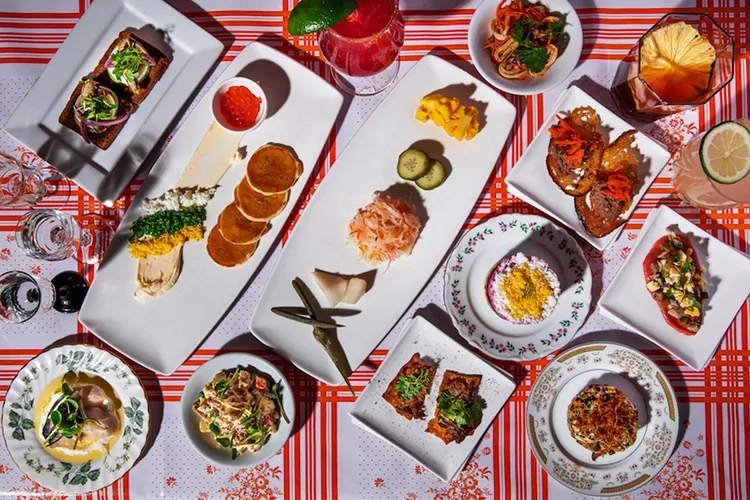Summary
Discovering Portland’s Rich Post-Soviet Cuisine
Eat your way through the city’s rich, genre-defying “post-Soviet cuisine.”
Exploration of Post-Soviet Cuisine
Before Fatima Magomadova allows her new employees to stir kidney beans into borscht, roll crêpes filled with mushrooms, and caramelize carrots for rice pilaf, she poses a simple but revealing question: “What do you cook at home for New Year’s?” Answers vary, showcasing a colorful array of salads, soups, and entrées reflecting the diverse cultures of the former Soviet Union. For many staff members at Roman Russian Market and its neighboring Rough Russian Café, this marks their initial job in the United States. If they can relate to this food, they earn the position.
Cooking in Portland: A Cultural Blend
Magomadova arrived in Portland in 1996 after fleeing the war in Chechnya. Her team includes several recent immigrants from Ukraine who predominantly speak Russian, the third most-spoken language in Oregon, following English and Spanish. Immigrants escaping religious persecution or civil strife in Eastern Europe frequently passed through various regions before arriving in Oregon. Here, they discovered a city offering freedom of worship and a climate that supported the growth of familiar produce, including a variety of root vegetables. Recent arrivals from the post-Soviet era, fleeing poverty or conflict, have naturally gravitated towards the established Russian-speaking communities in Southeast Portland.
A shared language unites these communities, alongside the tantalizing aroma of sunflower oil with its hints of forest, and the ubiquitous flavor of sour cream, a staple in many dishes across the former Soviet republics. While newcomers from the South Caucasus or Central Asia serve differing dishes, the historical and cultural dominance of Russia in the U.S.S.R. has created many culinary similarities.
Notable Restaurants in Portland
:max_bytes(150000):strip_icc():format(webp)/TAL-anna-lisa-chacon-kachka-PORTLANDFOOD1122-63bcb26a49554bba924dedc71d7e6476.jpg)
Kachka has quickly become one of the city’s most popular dining spots since its inception in 2014. Owner Bonnie Morales, the daughter of Soviet immigrants, initially expressed concern regarding public reception of dishes such as salt-cured herring, which she herself found embarrassing growing up. However, at Kachka, Morales artfully incorporates it into a traditional salad composed of beets, carrots, and sunflower mayonnaise. To her surprise, the restaurant has received national recognition and a James Beard Award nomination for Best New Restaurant.
In the context of her upbringing, Morales emphasizes the uniqueness of post-Soviet cuisine. “In the Soviet Union, there was a nationalized food system that created a shared culinary experience across eleven time zones,” she explains, underscoring the difficulty of categorizing this diverse cuisine.
:max_bytes(150000):strip_icc():format(webp)/TAL-dediko-toast-and-dumplings-PORTLANDFOOD1122-12e6deaff86f4221b66169d7ee4c176b.jpg)
Nearby, Andrey Georgiyev, who was born in Ukraine and raised in Portland, opened Pelmeni Pelmeni in 2017, where he serves his signature dumpling, filled with chicken, using a quintessential Portland approach—from a food truck.
Across the Columbia River in Vancouver, Washington, Dediko presents classic Georgian dishes such as tarragon soda and khinkali (soup dumplings filled with meat and spices), expertly crafted by Ella Bakh, a Georgian native who has resided in the Vancouver-Portland area for over two decades. Bakh, a former florist, discovered her passion for cooking and launched her restaurant in 2019 alongside her son, Nico. Dediko boasts an impressive selection of khachapuri (cheese breads) complemented by an extensive collection of Georgian wines and dishes featuring walnuts, a staple of Georgian cooking.
Additionally, Georgian wines are a highlight at Morales’s new daytime café, Kachka Lavka, located above the main restaurant. Here, patrons can purchase bottles alongside sweet treats by Only Child Chocolate Co., created by Russian-Jewish chocolatier Yana Yakhnes, originally from Moscow.
“I ultimately want to share my food and culture with everyone,” Morales reflects. “It is loving and warm, and it is what brings me the greatest comfort.”




